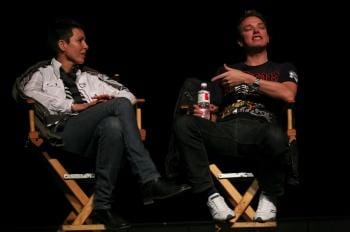At the end of the CBC Winnipeg Comedy Festival’s rollicking, revealing gender panel, artistic director Al Rae said, “I was hoping this would clarify things. But it’s just confusing me.”
The panel’s token straight guy got sandbagged by a flood of queer commentary. For over an hour, moderator Meryn Cadell navigated a sea of gay topics ranging from trans politics to topping.
Besides Rae, Cadell’s panel included three of Canada’s funniest queers: Elvira Kurt, Trevor Boris and Clare Lawlor.
The event kicked off with a bold challenge from Lawlor to Kurt. “I’m butcher than Elvira,” Lawlor said, suggesting a wen-do fight.
Boris, caught between the two women, sensed “sexual tension.” But Lawlor and Kurt insisted they’re into femmes.
Growing up, Lawlor said she was always butch. “I wanted to be a boy more than anything. Being a boy meant you could be with a girl.” When she was six, her mother caught her kissing a mannequin’s nipples.
Like Lawlor, Kurt claimed the “boy role” and embraced her tomboy phase. She said getting boobs was a “drag.”
Cadell, a female-to-male transsexual, pounced on their gender talk by asking if they ever considered transitioning.
“I never felt like I was a man,” responded Lawlor. “I wanted to be a man, and get power, options … and the babe!”
Kurt said, “I felt bad about looking like a woman but never felt in my core that it was wrong.” Now, she said, she embraces the “male aesthetic, but in a body I love. Being butch means being true to myself, and forces people to make room for something that’s not the binary.”
“I always think as a male I would be a premature ejaculator,” blurted Lawlor.
“I feel like you’re confusing the panel with therapy,” cracked Boris.
Then, Cadell pointed out that Boris recently ended a five-year relationship with a drag queen. He asked the young comedian what he thought of his ex’s cross-dressing.
“To be honest, at first, I was kind of uncomfortable with it,” Boris said. “I called it scare-eoke. I kind of discouraged it.” But he’s getting over his aversion to drag.
His new flame is a queen, too. “We’re both performers,” he said, “so we relate in that way.” Plus, he added, “it’s glamorous to be a woman.”
Boris doesn’t get drag kings, though. “There’s nothing glamorous about being a man.” Then, imitating an announcer, he said, “‘Please welcome Jimmy from accounting!'”
Kurt asked Boris if he and his latest beau have discussed drag. The relationship is “still kinda new,” Boris said.
“Or you’re shallow and you haven’t talked about it yet?” Kurt teased.
Cadell asked the panellists if they would consider dating outside their orientation.
Rae, the straight guy, shifted uncomfortably and said, “I’ve always been attracted to women who I find out are gay.”
Boris ruled out women completely. “I was born Caesarean,” he quipped. “I’ve never even seen a vagina. It makes me uncomfortable just to think about it.”
Lawlor said, “I’ve had crushes on men. And women in drag are totally hot. But I don’t like the penis thing.” Except, she added, “I have several at home!”
Kurt was the only panellist who admitted to dabbling. Not long ago, she and a partner played with a straight couple. “I enjoyed penis immensely,” said Kurt. “I like men and the male physique is appealing. But to go the extra mile with a relationship would be soul-destroying.”
Kurt is curious about top/bottom roles in gay male relationships, though.
Boris said he’s a top, but added, “it’s actually quite nice to be the bottom sometimes.”
“Less work?” asked Kurt.
“No,” snapped Boris. “I’m a power-bottom, motherfucker!”
Finally, the subject of the word ‘queer’ came up. Kurt likes it; Lawlor doesn’t.
“I’m more queer than dyke,” said Kurt. “It’s a gender radical way of identifying yourself.” She supports straight people using the term, as long as they “fall outside the hetero-normative.”
But Lawlor doesn’t buy it. Calling yourself queer, she said, “doesn’t mean you’re gonna have sex with me.” She says it should mean “I fuck people of my own gender.”
‘Queer’, she concluded, “should be earned.”

 Why you can trust Xtra
Why you can trust Xtra


